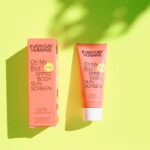You might think that skipping sunscreen is a minor oversight, but it can have significant consequences for your skin. The sun emits harmful ultraviolet (UV) rays that can lead to premature aging, sunburn, and even skin cancer. When you neglect to apply sunscreen, you expose your skin to these damaging rays, increasing your risk of developing dark spots, wrinkles, and other signs of aging.
Even on cloudy days or during winter months, UV rays can penetrate through the clouds and still affect your skin. Therefore, it’s crucial to make sunscreen a non-negotiable part of your daily skincare routine. Moreover, the type of sunscreen you choose matters just as much as applying it.
Broad-spectrum sunscreens protect against both UVA and UVB rays, which is essential for comprehensive skin protection. You should look for a sunscreen with an SPF of at least 30 and reapply it every two hours, especially if you’re spending time outdoors. Remember that even if you’re indoors, UV rays can still reach you through windows.
By consistently applying sunscreen, you not only safeguard your skin from immediate damage but also invest in its long-term health and appearance.
Key Takeaways
- Skipping sunscreen can lead to sun damage, premature aging, and an increased risk of skin cancer.
- Excessive sun exposure can cause sunburn, skin damage, and increase the risk of skin cancer.
- Using harsh exfoliants can damage the skin’s protective barrier and lead to irritation and sensitivity.
- Ignoring ingrown hairs can lead to infection and inflammation, causing discomfort and potential scarring.
- Touching or picking at treated areas can introduce bacteria and lead to infection, delaying the healing process.
Excessive sun exposure
The Risks of UV Rays
The more you expose your skin to harmful UV rays, the higher your risk of developing skin conditions such as melanoma or other forms of skin cancer. It’s essential to find a balance between enjoying the sun and protecting your skin.
The Effects of Photoaging
Excessive sun exposure accelerates the aging process of your skin. You might notice that your skin becomes rougher, develops fine lines, and loses its youthful elasticity. This phenomenon, often referred to as photoaging, occurs when UV rays break down collagen and elastin fibers in the skin.
Protecting Your Skin
To mitigate these effects, consider seeking shade during peak sun hours, wearing protective clothing, and using broad-spectrum sunscreen diligently. By being mindful of your sun exposure, you can enjoy the outdoors while keeping your skin healthy and vibrant.
Using harsh exfoliants

You may believe that using harsh exfoliants is the key to achieving smooth and radiant skin, but this approach can backfire. While exfoliation is essential for removing dead skin cells and promoting cell turnover, overdoing it with aggressive scrubs or chemical exfoliants can lead to irritation and damage. Your skin has a delicate balance that can be disrupted by excessive exfoliation, resulting in redness, sensitivity, and even breakouts.
Instead of achieving that coveted glow, you might find yourself dealing with a compromised skin barrier. To achieve effective exfoliation without harming your skin, consider opting for gentler alternatives. Look for products with mild exfoliating agents like lactic acid or enzymes that provide a more balanced approach to sloughing off dead skin cells.
Additionally, limit your exfoliation routine to once or twice a week to allow your skin time to recover. By treating your skin with care and using appropriate products, you can enjoy the benefits of exfoliation without the adverse effects associated with harsh treatments.
Ignoring ingrown hairs
| Metrics | Values |
|---|---|
| Number of ingrown hairs | 25 |
| Percentage of people affected | 15% |
| Common affected areas | Legs, bikini line, beard area |
| Preventive measures | Exfoliation, proper shaving techniques |
You might think that ingrown hairs are merely a cosmetic nuisance, but ignoring them can lead to more significant issues. Ingrown hairs occur when hair grows back into the skin instead of rising up from it, often resulting in painful bumps and inflammation. If left untreated, these ingrown hairs can become infected or lead to scarring.
It’s essential to address them promptly to prevent complications and maintain healthy skin. To manage ingrown hairs effectively, consider incorporating gentle exfoliation into your routine to help free trapped hairs. You can also use products containing salicylic acid or glycolic acid to reduce inflammation and promote healing.
If an ingrown hair becomes particularly bothersome or shows signs of infection, don’t hesitate to consult a dermatologist for professional advice. By taking proactive steps to address ingrown hairs, you can keep your skin smooth and free from irritation.
Touching or picking at treated areas
You may find it hard to resist the urge to touch or pick at treated areas on your skin, especially after undergoing procedures like waxing or laser treatments. However, this habit can lead to serious complications. Touching or picking at these areas introduces bacteria from your hands into open pores or wounds, increasing the risk of infection and prolonging the healing process.
Instead of helping your skin recover, this behavior can result in scarring or hyperpigmentation.
Additionally, applying soothing creams or ointments can help alleviate any discomfort you may feel after treatment, reducing the temptation to touch the area.
Remember that patience is key; allowing your skin to heal naturally will yield better results than succumbing to the urge to pick or touch.
Using hot water on treated areas

You might enjoy a hot shower or bath as a way to relax after a long day, but using hot water on treated areas can be detrimental to your skin’s health. Hot water strips away natural oils and can lead to dryness and irritation, especially on sensitive or recently treated skin. If you’ve undergone any cosmetic procedures or treatments, exposing those areas to hot water can exacerbate redness and inflammation, hindering the healing process.
Instead of hot water, consider using lukewarm water for cleansing treated areas. This gentler approach will help maintain your skin’s moisture barrier while still providing a refreshing cleanse. After washing, be sure to apply a hydrating moisturizer to lock in moisture and soothe any irritation.
By being mindful of water temperature during your skincare routine, you can promote healing and maintain healthy skin.
Applying heavy lotions or creams
You may believe that slathering on heavy lotions or creams will provide intense hydration for your skin; however, this approach can sometimes do more harm than good. Thick products can clog pores and lead to breakouts, especially if you have oily or acne-prone skin. Instead of achieving that dewy glow you desire, you might find yourself battling unwanted blemishes and irritation.
To keep your skin hydrated without overwhelming it with heavy products, opt for lightweight moisturizers that contain hydrating ingredients like hyaluronic acid or glycerin. These ingredients provide moisture without suffocating your pores. Additionally, consider layering products—using a serum followed by a lighter moisturizer—to achieve optimal hydration without the risk of clogging pores.
By choosing the right products for your skin type, you can maintain a healthy balance while keeping your complexion radiant.
Ignoring any unusual side effects
When it comes to skincare treatments or products, it’s crucial not to ignore any unusual side effects that may arise. Whether it’s redness, swelling, itching, or any other unexpected reaction, these symptoms could indicate an adverse response to a product or treatment. Ignoring these signs could lead to more severe complications down the line and compromise your overall skin health.
If you experience any unusual side effects after trying a new product or undergoing a treatment, take immediate action by discontinuing use and consulting a dermatologist if necessary. They can help identify the cause of the reaction and recommend appropriate alternatives tailored to your skin’s needs. By being attentive to how your skin responds to various treatments and products, you empower yourself to make informed decisions that prioritize its health and well-being.
In conclusion, taking care of your skin requires mindfulness and attention to detail. From applying sunscreen diligently to avoiding harsh treatments and being aware of unusual side effects, each step plays a vital role in maintaining healthy and radiant skin. By adopting these practices into your daily routine, you not only protect your skin from immediate damage but also invest in its long-term vitality and beauty.
Remember that healthy skin is not just about appearance; it reflects overall well-being and self-care.
After undergoing laser hair removal, it is important to follow proper aftercare instructions to ensure the best results. One important aspect of aftercare is knowing what not to do. In a related article on inlaserhairremoval.com, they discuss the don’ts of laser hair removal aftercare. This article provides valuable information on what activities to avoid in order to prevent any complications or adverse effects post-treatment. It is essential to educate yourself on the proper aftercare practices to maintain smooth and hair-free skin.
FAQs
What are some common aftercare don’ts for laser hair removal?
Some common aftercare don’ts for laser hair removal include avoiding sun exposure, hot showers, and using harsh skincare products on the treated area.
Why should I avoid sun exposure after laser hair removal?
Sun exposure can increase the risk of hyperpigmentation and skin damage after laser hair removal. It is important to protect the treated area from the sun by using sunscreen and covering up with clothing.
Why should I avoid hot showers after laser hair removal?
Hot showers can increase inflammation and irritation in the treated area, leading to discomfort and potential complications. It is recommended to take lukewarm showers instead to promote healing.
Why should I avoid using harsh skincare products on the treated area after laser hair removal?
Harsh skincare products, such as exfoliants and acids, can irritate the skin and interfere with the healing process after laser hair removal. It is best to use gentle, non-irritating skincare products on the treated area.





